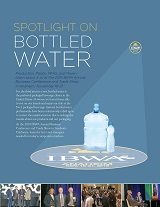In Hamilton, Ohio, a water main broke. It’s all repaired now, but up until then, according to The Journal-News:
The city issued the advisory following a water main break off Symmes Road about midnight on Tuesday, April 1. Advisories are issued as a precaution following a loss of pressure. It warns residents and businesses to use bottled water or boiled water for cooking, drinking or teeth brushing.
And in Southern Oregon, lead was found in an elementary school at levels almost double what was seen in 2006. Bottles of water were also given to children.
Not to say that tap water isn’t safe – in most cases, it is.
But these scenarios surely make you wonder: if some places are banning the purchase of bottled water by local governments, what happens when that government needs to rely on it?
The International Bottled Water Association (IBWA) is the authoritative source of information about all types of bottled waters. Founded in 1958, IBWA's membership includes U.S. and international bottlers, distributors and suppliers. IBWA is committed to working with the U.S. Food and Drug Administration (FDA), which regulates bottled water as a packaged food product, and state governments to set stringent standards for safe, high quality bottled water products. Additionally, IBWA requires member bottlers to adhere to the IBWA Bottled Water Code of Practice, which mandates additional standards and practices that in some cases are more stringent than federal and state regulations. A key feature of the IBWA Model Code is an annual plant inspection by an independent, third party organization.
For more information about IBWA, bottled water and a list of member‚ brands, please contact
Jill Culora, IBWA‚ Vice President of Communications at 703-647-4609 or [email protected].



























